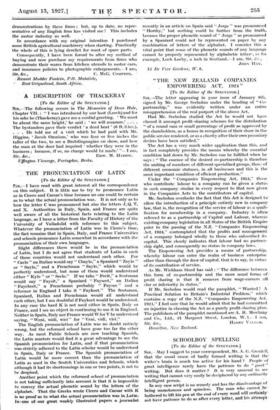"THE NEW ZEALAND COMPANIES EMPOWERING ACT, 1924 "
[To the Editor of the SPECTATOR.] SIR,- The letter appearing in your issue of January 8th, signed by Mr. George Seebohm under the heading of " Co- partnership," was evidently written under an entire misapprehension of the real purport of the above Act.
Had Mr. Seebohm studied the Act he would not have classed it amongst profit-sharing schemes for the distribution. " of a round sum or small percentage of profit as approved by the shareholders, as a bonus in recognition of their share in the public service rendered, or as a charity after their own pecuniary desires have been satisfied."
The Act has a very much wider application than this, and in fact completely provides the means whereby the essential condition laid down by Mr. Seebohm can be fulfilled when he says : " The essence of the desired co-partnership is therefore the uniting of members of different specialized groups, thoss of different economic statuses, in all businesses and this is the most important condition of efficient production."
Under the " Companies Empowering Act, 1924," those who contribute labour to a company can be given a status in such company similar in every respect to that now given in the Companies Acts to the contributors of capital.
Mr. Seebohm overlooks the fact that this Act is designed to allow the introduction of a principle entirely new in company law, thatis, the recognition of the service of labour as a quali- • fication for membership in a company. Industry is often referred to- as a partnership of Capital and Labour, whereas existing company legislation in all States of the British Empire. pridr to the passing of the N.Z. "Companies Empowering Act, 1924," contemplated that the profits and management of a company belonged wholly to those who subscribed its capital. This clearly indicates that labour had no partner- ship right, and consequently no status in company laws. -
The Empowering Act provides a means of partnership, whereby labour can enter the. realm of business enterprise other than through the door of capital, that is to say, in virtu:: of its contribution of service.
As Mr. Wickham Steed has said : " The difference between this form of co-partnership and the more usual forms of : profit sharing is that it removes from wage-earners all slur or inferiority in status."
If Mr. Seebohm would read the pamphlet, " Wanted ! A Practical Solution to Britain's Industrial Problem," which contains a copy of the N.Z. "Companies Empowering Act, 1924," I feel sure that he would admit that -he had committed an injustice in classing the Act as a purely profit-sharing plan. The publishers of the pamphlet mentioned are A. R. Moss bray and Co., Ltd., 31 Margaret Street, London, W. 1,-1 anti






























 Previous page
Previous page